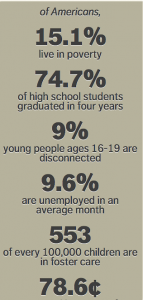wages
Last summer we marked the 75th anniversary of President Franklin D. Roosevelt’s signing of the Fair Labor Standards Act – a landmark law that protected children, limited the number of hours in a workweek, and established the nation’s first minimum wage. The genesis of that law is often traced back to the story of one little girl who managed to get a poignant letter in the hands of the campaigning president. The note read:
“I wish you could do something to help us girls. We have been working in a sewing factory, and up to a few months ago we were getting our minimum pay of $11 a week. Today the 200 of us girls have been cut down to $4 and $5 and $6 a week.”
During this season of Lent, as we ponder the deep meaning of our faith, we also contemplate what that faith teaches us about the inherent dignity of every human being, how it compels us to better listen to one another, and why we must always strive to better serve one another.
ON NOV. 5, 2013, the people of SeaTac, Wash., enacted the highest minimum wage in the country, $15 an hour, more than double the federal minimum wage of $7.25 an hour.
On Black Friday, the biggest shopping day of the year, Wal-Mart workers at more than 1,500 store locations conducted protests and informational pickets. Fast-food workers in more than 100 cities protested in front of McDonalds, KFC, and Taco Bell stores, calling for wage increases.
Across the U.S., a grassroots movement is blossoming to address the extreme inequality of wealth and wages. Led by low-wage workers and bolstered by faith community leaders, this movement is shining a spotlight on the glaring disparity of wages, wealth, and opportunity.
The wealthiest 1 percent of households, those with annual incomes over $555,000, now receives more than 21 percent of all income. Meanwhile, millions of low-wage workers subsist on the federal minimum wage, which is $15,080 a year for a full-time worker. As a result, many low-wage workers depend on charity and public subsidies such as food stamps and Medicaid to survive.
If the minimum wage had kept up with inflation since 1968, it would now be $10.74, enough to boost a family of three over the federal poverty line, according to the Economic Policy Institute. If the minimum wage had increased at the pace of worker productivity, it would be $18.72 an hour today.
WITH A ONE-TWO punch, 2012 was bracketed by the speedy and unexpected adoption of so-called "right-to-work" laws to undermine labor unions in two Midwestern states—Indiana and Michigan. That was preceded in 2011 by other bad news for labor: frontal assaults on public employee unions in Wisconsin and in Ohio. The assault in Wisconsin succeeded despite the political firestorm it generated, but Ohio voters overrode the efforts of their governor and legislators to gut public-employee bargaining rights.
Yes, the labor wars are on full force in the Midwest—and they are challenging faith communities to dig back into their teachings about the dignity of work, the rights of workers, and the pursuit of justice.
Bishop Thomas Gumbleton, retired auxiliary bishop of the Catholic archdiocese of Detroit, minced no words in his article for the Kalamazoo Gazette in mid-December. "Right-to-work laws go against everything we believe," he wrote. "At the core of Christianity, Judaism, Islam, and all great religions are the values of dignity and respect, values from which economic justice and the right to organize can never be separated."
The phrase "right to work" sounds noble, but these laws are not about guaranteeing anyone meaningful employment. Instead, they prohibit union contracts with employers from requiring non-union employees—who benefit from the union's work negotiating wages and benefits—to pay dues in recognition of that fact.

Red heart balloon. Image via Wylio, http://bit.ly/yctzSw.
Now we are at Valentine’s Day a year later. For many months last spring, a solitary red heart balloon floated just under the dome of the Capitol. It became a gentle symbol of this powerful people’s uprising.
The red heart balloon can serve as a reminder of how God’s Spirit blows whichever way it will, but that God’s Spirit is a spirit of justice and of compassion. As Bishop Burnside said, voices of faith need both a vocabulary of love and a vocabulary of justice as we move into the highly-charged months ahead.

Perhaps the most important finding from the report is that we have both the experience and the policy tools necessary to cut poverty in half.
Between 1964 and 1973, under both Democratic and Republican administrations, the U.S. poverty rate fell by nearly half (43 percent) as a strong economy and effective public policy initiatives expanded the middle class.
Similarly, between 1993 and 2000, shared economic growth combined with policy interventions such as an enhanced earned income tax credit and minimum wage increase worked together to cut child poverty from 23 percent to 16 percent.
We can't do this alone.
About two years ago, Minhee and I made one of the hardest decisions we've made thus far in our marriage and in our calling as parents.
In our hope to honor a conviction of the Holy Spirit to give up a year's salary, we had begun the two-year process of saving, selling, and simplifying in 2007. Our goal was to come up with our then year's wages of $68,000 -- in order to launch One Day's Wages. With only a few months left to come up with the total sum, we were a bit short and decided to sublet our home for couple months and asked some friends if we could stay with them on their couches or their guest room.
Needless to say, it was a very humbling time.
Our instruction for ourselves and our children were very simple: Each person gets one carry-on bag for their belongings.
Do yourself a favor and watch this. It's 7:15 minutes long but well worth your time.
Such a substantive leadership lesson in itself by Bill Hybels as he explains why Howard Schultz withdrew his commitment as a speaker at the Willow Creek Leadership Summit (held on August 11-12). And furthermore, how he and Willow Creek are responding
Why?


